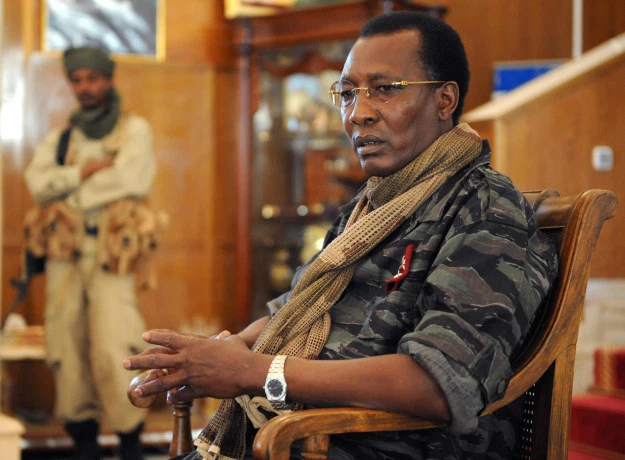Chad President Idriss Déby has died just a day after he won a sixth term in office.
Déby who has led Chad for 30 years, was re-elected for a sixth term with 79.32 percent of the vote, according to official results released Monday shortly after the army said it had defeated a rebellion launched on election day April 11 and killed “more than 300 enemies.
The turnout was 64.81 percent for the election, which the outgoing head of state won unsurprisingly in the first round, said the chairman of the Independent National Electoral Commission (Ceni), Kodi Mahamat Bam, in releasing the official “provisional” figures. The Supreme Court still has to approve them after considering possible appeals.
Déby’s former and last prime minister, Albert Pahimi Padacké, came second with 10.32% of the votes cast. The first woman to run in a presidential election, Lydie Beassemda, came third with 3.16% of the vote.
Nine candidates were officially running against Mr. Déby, but three had announced their withdrawal and called for a boycott of the election, citing the violent repression of all the “peaceful marches” organized in recent months to demand “change of power. The Supreme Court, however, kept their names on the ballot.
No surprise
Marshal Déby’s re-election was widely anticipated by Chadians who voted on April 11, according to AFP journalists in N’Djamena. The incumbent was opposed by six candidates with no political weight.
Immediately after the results were announced, large numbers of activists from Mr. Déby’s party, the Patriotic Salvation Movement (MPS), were singing and dancing in the central Place de la Nation in N’Djamena. Sporadic automatic gunfire rang out as Déby’s supporters celebrated victory as they had in each of the previous five elections since he took power by force of arms in 1990.
“We are celebrating a beautiful victory in the first round, but we also have a very strong thought for our brothers, our comrades, soldiers of the Chadian army who fell on the field of honor to defend peace, democracy and the continuity of the institutions of the state,” said the secretary-general of the MPS, Mahamat Zen Bada.
The Chadian army claimed on Monday to have killed more than 300 rebels who have been making an incursion into the north of the country for the past eight days, and to have taken 150 prisoners and lost five soldiers in the fighting, while the government assured that the situation is under control.
The Front for Change and Concord in Chad (FACT) launched its offensive from its rear bases in Libya on April 11, the day of the presidential election.
On Saturday, the government said the offensive in the provinces of Tibesti and Kanem had “ended. But fighting resumed late Sunday afternoon, according to army spokesman General Azem Bermandoa Agouna. “The situation is calm at the moment on the front,” he said Monday morning.
FACT, for its part, assured Sunday that it had taken control of Kanem, where Saturday’s fighting took place. The claims of either side cannot be independently verified, as access to the combat zones is forbidden.
Tanks in N’Djamena
“The rebels are still 500 km from N’Djamena. Mr. Déby’s interest is not to fight as far away as possible but to keep troops around the capital,” analyzed Roland Marchal, a researcher at the Centre de recherches internationales (Ceri) at Sciences Po Paris, in the afternoon.
Tanks were positioned Monday on the main avenues of the capital, which led to scenes of panic. These tanks were withdrawn at the end of the morning, with the exception of a perimeter around the presidency.
“The establishment this morning of a security device in some places in the capital seems to be misinterpreted. I want to reassure that there is no particular threat,” said Cherif Mahamat Zene, the government spokesman, on Twitter.
The French embassy also stressed to its citizens that this was “a precautionary measure, for dissuasive purposes, without any particular threat to the capital.
In the Tibesti massif, bordering Libya, but also in the northeast, which borders Sudan, Chadian rebels regularly confront the army from their rear bases in these countries. Additional reporting by AFP.










